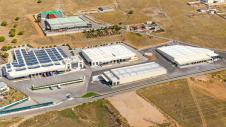Prosperty CEO Antonis Markopoulos identifies the opportunities and challenges posed by the health crisis and the digital revolution of the real estate market by offering a new platform that promises to change the way property is bought and rented through integrated digital solutions and automated processes that boost transparency and innovation.
In an interview with Business Daily, Markopoulos refers to the changes brought on by the pandemic in the real estate market, emphasizing that this is an economic crisis that will affect real estate prices but not directly.
"A market correction is expected for a period of six to twelve months. However, the pressure on property prices will not be horizontal," he notes, citing examples from those who will benefit from the conditions.
"Homes in areas with consistently high demand, such as the center of Athens and Thessaloniki, will be more resistant to any correction, while in newly built properties, support measures offered to builders will play a decisive role. On the other hand, it is predicted that there will be pressure on commercial real estate, such as offices and shops. Also, logistics centers is the category of real estate that is most benefitted, as their demand seems to be rising, due to the significant increase in e-commerce in the Covid-19 era," he notes.
According to Markopoulos, another investment opportunity is tourist properties. "Tourist real estate is perhaps the biggest investment opportunity of the next period, as it will be temporarily under pressure, but the future in the post-covid era is considered favourable. Many Northern Europeans are considering the possibility of buying a holiday home in Greece, a fact which has been boosted by the effective management of the pandemic so far, when compared to competitive markets, such as Italy and Spain," he added.
A new trend that is emerging in the office market: demand for small, flexible, affordable spaces with a very fast network and the necessary technological equipment to work with small groups of executives or departments. As a result, many investors see an opportunity in this sector to sublease short-term parts of their building to companies. Of course, it should be noted that this trend concerns companies with low levels of human resources that can be easily moved and adapted. The big companies, with more than two hundred employees, will continue to need their physical headquarters, added Markopoulos.
Catching up on lost ground
"Undoubtedly, compared to the recent past, Greece is regaining lost ground in the real estate market and this is due to many factors", notes Markopoulos, emphasizing that the "economic recovery from the decade of recession, the admittedly successful management of the first wave of the pandemic and the recent investments of multinationals, in connection with the exceptional weather and easy / pleasant life, which have consolidated a strong demand for residential destination all year round."
Competitive real estate prices compared to other Mediterranean countries, the significant increase in tourism (with the exception of this year), along with proper marketing can have a significant effect on the promotion of Greek investment property abroad, as supported by the CEO.
However, he notes, that the obstacle preventing many buyers from abroad from buying in Greece is bureaucracy and lack of transparency in real estate transactions.
"The existence of Prosperty, a digital platform, which makes the whole process of buying and renting a property reliable and transparent, creates the conditions for Greek property to be successfully promoted abroad for the first time. It is indicative that our digital platform in just four months has seen over 100,000 searches coming from 120 different countries", he underlines.
Despite the digital revolution, the real estate market in Greece has not yet managed to integrate the new technology, thus creating room for distortions, Markopoulos emphasizes and mentions as the most important of these the lack of transparency and trust among buyers and sellers, low quality services being offered and hidden charges from different parties involved in the sales process.
"Therefore, the digitization of real estate, led by Prosperty, brings transparency to transactions and forms a framework of trust. How does this happen? By providing detailed information on the property, its real depiction through floor plans and 3D imaging and the provision of real time data. Thus, the interested party has a clear picture of the property he is going to buy or rent," he said.
Prosperty has made many strides in a short period of time. In its first four months of operating, it has secured 1.1 million euros of seed funding from funds Velocity Partners and Metavallon as well as from angel investors, while it already has a portfolio under management in excess of 300 million euros.
To date, the platform manages real estate in Athens and Thessaloniki and other areas of high commercial interest, such as Halkidiki and the southern Peloponnese, while interest is also strong on islands such as Mykonos, Paros, Santorini and Crete.









